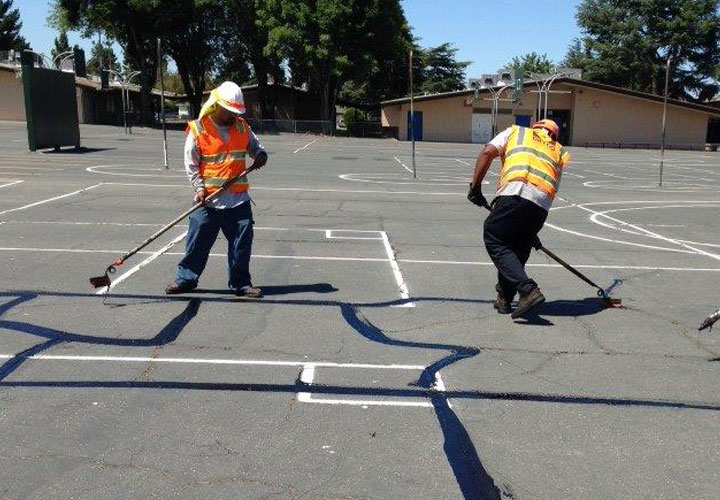Improve Durability with Cold Mix Asphalt: Expert Sealing Solutions
Improve Durability with Cold Mix Asphalt: Expert Sealing Solutions
Blog Article
Cold Mix Asphalt Vs. Hot Mix Asphalt: Which Is Right for You?

Composition Distinctions
Cold mix and warm mix asphalts vary considerably in their make-up, with distinctive qualities that affect their efficiency and applications. Cold mix asphalt is generated by emulsifying the asphalt binder with water and an emulsifying agent before mixing it with aggregate. This method permits for the asphalt to be practical at reduced temperature levels, making it excellent for short-term repair services and for use in cooler climate condition. Hot mix asphalt, on the various other hand, is manufactured at heats, commonly between 300-350 ° F, which aids to attain much better compaction and a much more long lasting end product. The warm mix asphalt manufacturing process involves heating up the aggregate and asphalt binder individually before integrating them at the asphalt plant.
Furthermore, cool mix asphalt often tends to be less dense and a lot more adaptable than hot mix asphalt. This flexibility makes it far better suited for locations with greater degrees of motion, such as driveways or roads with hefty traffic. In contrast, warm mix asphalt is known for its high resilience and resistance to rutting and cracking, making it a preferred selection for freeways and high-traffic roadways where durability is vital.
Installment Refine Variances
The procedure of installing chilly mix and warm mix asphalt exhibits significant variances in their procedures and needs. In comparison, warm mix asphalt demands an extra sophisticated installment procedure. Due to the heating needs, hot mix asphalt setups are generally lugged out by professionals with specific tools, making certain a much more permanent and structurally audio outcome.
Longevity and Durability Aspects
When thinking about asphalt options, longevity and longevity are important variables to assess for enduring sidewalk performance. Hot mix asphalt (HMA) is recognized for its exceptional longevity and durability.
In regards to durability, HMA usually surpasses CMA as a result of its superior stamina and resistance residential or commercial properties. HMA sidewalks have a longer service life, calling for less regular repair services and maintenance, which can convert to cost savings in the lengthy run. Furthermore, HMA pavements are more conveniently personalized to meet certain task needs, even more improving their sturdiness.
Cost Considerations
Considering the economic ramifications is an essential aspect when reviewing the choice in between warm mix asphalt (HMA) and cold mix asphalt (CMA) for sidewalk tasks. While the initial cost of warm mix asphalt is usually greater than that of cool mix asphalt, HMA often provides a official source more cost-efficient service over time because of its premium sturdiness and longevity. HMA is known for its capacity to hold up against rush hour tons and extreme climate condition, reducing the requirement for regular repair services and maintenance. On the various other hand, chilly mix asphalt is extra budget friendly upfront yet might need even more regular patching and resurfacing, bring about higher maintenance costs with time.
In addition to material expenses, it's important to think about the expenditures associated with setup and maintenance when contrasting HMA and CMA. Eventually, the decision in between HMA and CMA must take right into account not simply the initial cost yet also the long-term monetary effects to establish the most affordable choice for the specific pavement task.
Environmental Effect Comparison
Comparison of the ecological influences between warm mix asphalt (HMA) and chilly mix asphalt (CMA) reveals distinctive differences in sustainability techniques. HMA manufacturing requires high temperature levels, resulting in boosted power intake and greenhouse gas emissions. The procedure also releases unpredictable natural substances (VOCs) and unsafe air pollutants (HAPs) right into the ambience. On the other hand, CMA is generated and applied at lower temperatures, lowering energy use and emissions considerably. The lower production temperature levels of look at this web-site CMA cause lowered fuel usage and reduced degrees of carbon dioxide exhausts, making it a much more eco-friendly option.
Furthermore, the usage of CMA often involves reusing existing asphalt sidewalk, advertising source preservation and lowering the quantity of waste sent to landfills. By choosing for CMA over HMA, roadway building projects can add positively to ecological preservation efforts.
Verdict
To conclude, the choice between cold mix asphalt (CMA) and hot mix asphalt (HMA) depends on different aspects such as composition, setup process, sturdiness, longevity, expense, and ecological impact. angle parking. While CMA provides a fast and cost-effective remedy for minor repair services, HMA makes sure remarkable toughness and longevity for rush hour areas. Take into consideration these aspects very carefully to determine which kind of asphalt is the appropriate option for your paving needs

Thinking about the monetary effects is a critical facet when reviewing the choice in between hot mix asphalt (HMA) and chilly mix asphalt (CMA) for sidewalk jobs. While the first expense of warm mix asphalt is usually higher than that of cold mix asphalt, HMA typically gives a more cost-effective service in the lengthy run due to its premium durability and longevity. asphalt patch try this site repair.Comparison of the environmental effects in between hot mix asphalt (HMA) and cool mix asphalt (CMA) discloses distinct distinctions in sustainability practices.In conclusion, the option in between chilly mix asphalt (CMA) and hot mix asphalt (HMA) depends on numerous aspects such as composition, setup procedure, longevity, longevity, price, and ecological influence
Report this page